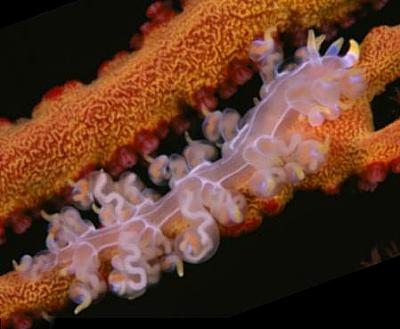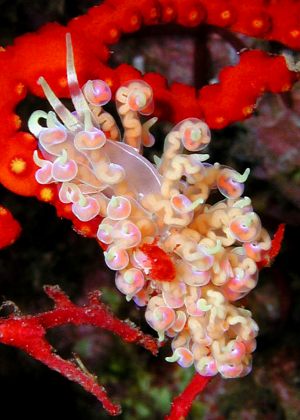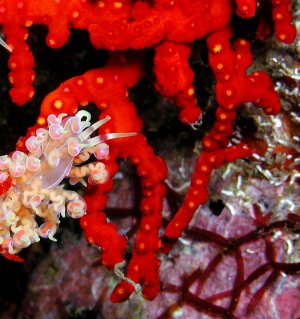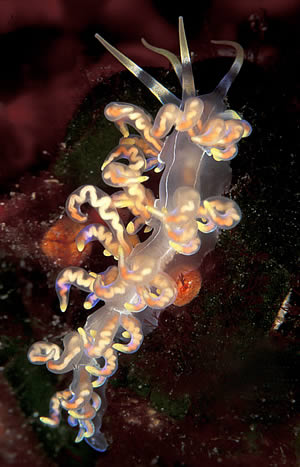
Phyllodesmium sp. 5
Order: NUDIBRANCHIA
Suborder: AEOLIDINA
Family: Glaucidae
PHOTO
Crawling along a branch of a sea fan. Kokoana Pass, Morovo Lagoon, Depth: 10 meters., New Georgia, Solomon Islands, December, 1999. Crawling length: 15 mm. Photo: Scott Waring
Compare with Phyllodesmium sp. 6.
Authorship detailsRudman, W.B., 2002 (April 7) Phyllodesmium sp. 5 [In] Sea Slug Forum. Australian Museum, Sydney. Available from http://www.seaslugforum.net/find/phyllodsp5
Related messages
Re: Phyllodesmium sp. 5 from Indonesia
October 17, 2008
From: Marcel Tanke

Concerning message #13122:
Dear Bill,
Is this indeed Phyllodesmium sp. 5?
Locality: Bali, Tulamben, 15 m, Indonesia, 3 October 2008, black sand. Length: 1 cm. Photographer: Marcel Tanke.
It is striking that it is feeding on the same red gorgonian coral as in the message I am replying to (Mike Oelrich 2005).
However, in the book “Nudibranchs of the world ” Debelius and Kuiter 2007, p.335, it is called P. sp. 7, also feeding on the same red gorgonian.
Best regards,
Marcel
Marceltanke@cs.com
Tanke, M.A., 2008 (Oct 17) Re: Phyllodesmium sp. 5 from Indonesia. [Message in] Sea Slug Forum. Australian Museum, Sydney. Available from http://www.seaslugforum.net/find/21964
Dear Marcel,
There is also another photo [message #7525] of it on a similarly coloured gorgonian. Your animal has none of the colour markings normally associated with this species but the twisted shape of the ceratal digestive gland and the red gorgonian host suggest a connection.
Concerning calling it 'Phyllodesmium sp 5' - that is not an official name, it's just the 5th unnamed Phyllodesmium on the Sea Slug Forum. In other websites and books it could be any number, so if you refer to it as 'Phyllodesmium sp 5' be sure to include a reference to the Sea Slug Forum otherwise no-one will know what you are talking about.
Best wishes,
Bill Rudman
Phyllodesmium sp. 5 from Indonesia
February 17, 2005
From: Mike Oelrich

Hi Bill,
I traveled to Indonesia (Raja Empat islands) in November 2004; I've attached a picture of a what I think is Phyllodesmium sp. 5 as it appears there aren't a lot of pictures of them in your archive.
Mike Oelrich
moelrich@cox.net
Oelrich, F.M., 2005 (Feb 17) Phyllodesmium sp. 5 from Indonesia. [Message in] Sea Slug Forum. Australian Museum, Sydney. Available from http://www.seaslugforum.net/find/13122Dear Mike,
Thanks for the photo. It is either Phyllodesmium sp. 5 or Phyllodesmium sp. 6. I guess it depends whether the white spots in Phyllodesmium sp. 6 rather than white lines are significant.
Best wishes,
Bill Rudman
The food of Phyllodesmium sp. 5
July 29, 2002
From: Nishina Masayoshi

Dear Bill,
I went to Hachijo Is. to confirm where Phyllodesmium sp. 5 lives. Fortunately, Kotaro Tanaka who is the owner of the diving operator "Con:color" at Hachijo Is. knows the place where they live and took us to the place.
As you suspected they live on the sea fan (may be Melithaea flabellifera) and lay their eggs there, I hope you could see the egg mass at middle and left of the photo. So I am pretty sure that this sea fan is the food and place where they live.
Data: 7 July, 2002
Location: Hachijo Island, Japan
Length: 15mm
Photo by C. Nishina
Best regards,
Nishina Masayoshi
nishina@wips.co.jp


Thanks Nishina,
This species fits the pattern in the genus in which the gorgonian feeders, presumably without zooxanthellae, have unbranched digestive gland ducts in their cerata.
Best wishes,
Bill Rudman
Phyllodesmium sp. 5 from Hachijo Island, Japan
May 22, 2002
From: Shouichi Kato

Dear Bill,
Could you please compare this aeolid with the one in my other mesage. They look very similar but this one has smooth rhinophores and fine white lines on its body.
I wonder if they are not same species.
I found it on the rocky reef shallower than 10m. 35mm in size.
Please advise.
Regards,
S. Kato
regulus@edit.ne.jp
Kato, S., 2002 (May 22) Phyllodesmium sp. 5 from Hachijo Island, Japan. [Message in] Sea Slug Forum. Australian Museum, Sydney. Available from http://www.seaslugforum.net/find/6963Dear Shouichi,
As you have noticed there are differences in colour and rhinophore morphology between the two animals. It is possible that the colour differences could be variation within a species, but combined with differences in rhinophore shape, I am pretty sure that these are different species. This animal is already on the Forum as Phyllodesmium sp. 5. If you see these two species again it would be nice to know what they eat, or are found on - Perhaps a soft coral or a gorgonian?
Best wishes,
Bill Rudman
Unknown Phyllodesmium from Solomons
April 10, 2002
From: Mary Jane Adams
Dear Bill!
The unknown Phyllodesmium species from the Solomon Islands I sent you [some time ago]appears to be a smaller version of a slug now posted on the Slug Site.
http://siolibrary.ucsd.edu/slugsite/nudwk257.htm
This larger specimen has much longer cerata, but the color bands in the rhinophores are exactly the same.
Best regards,
Mary Jane
divepng@yahoo.com
Adams, M.J., 2002 (Apr 10) Unknown Phyllodesmium from Solomons. [Message in] Sea Slug Forum. Australian Museum, Sydney. Available from http://www.seaslugforum.net/find/3805Dear Mary Jane
This is another message I have taken a long time to post. I agree its definitely the same as the one posted on the Slug Site. Best wishes,
Bill Rudman
Unknown from the Solomon Islands
January 6, 2001
From: Mary Jane Adams

Dear Bill,
This lovely photo was shot by Scott Waring in December, 1999. He said the slug was crawling along a branch of the sea fan and appeared to be feeding on something. Can you ID it?
Kokoana Pass, Morovo Lagoon, New Georgia, Solomon Islands
Crawling length: 15 mm
Depth: 10 meters
Water temp: 84 F
Thanks!
Mary Jane
divepng@yahoo.com
Adams, M.J., 2001 (Jan 6) Unknown from the Solomon Islands. [Message in] Sea Slug Forum. Australian Museum, Sydney. Available from http://www.seaslugforum.net/find/3358Dear Mary Jane,
If this is a nudibranch it is certainly not one I recognise. If it is an aeolid then its general shape and the suggestion that it is feeding on a gorgonian would suggest a species of Phyllodesmium.
But apart from that I can't say,
Best wishes,
Bill Rudman
